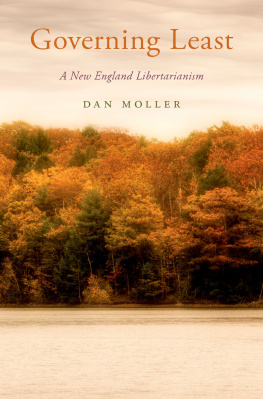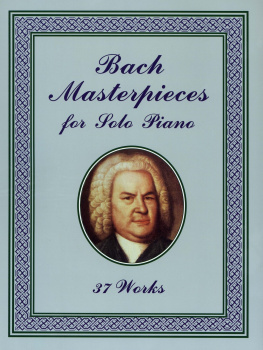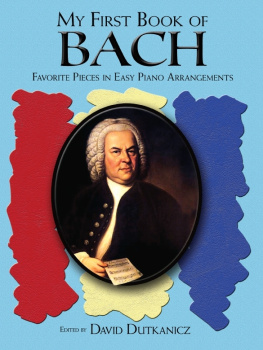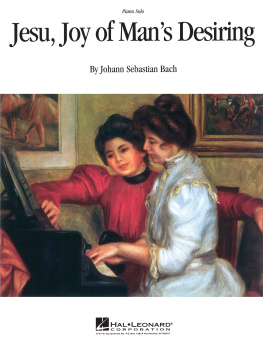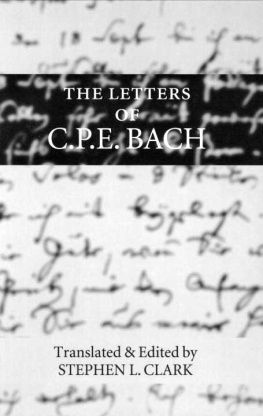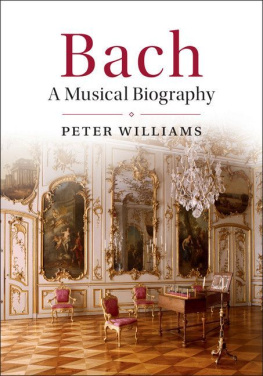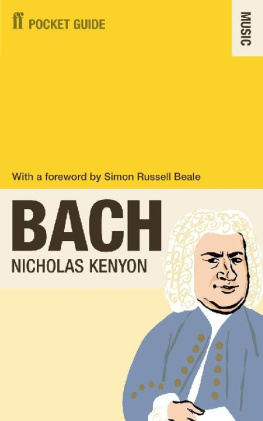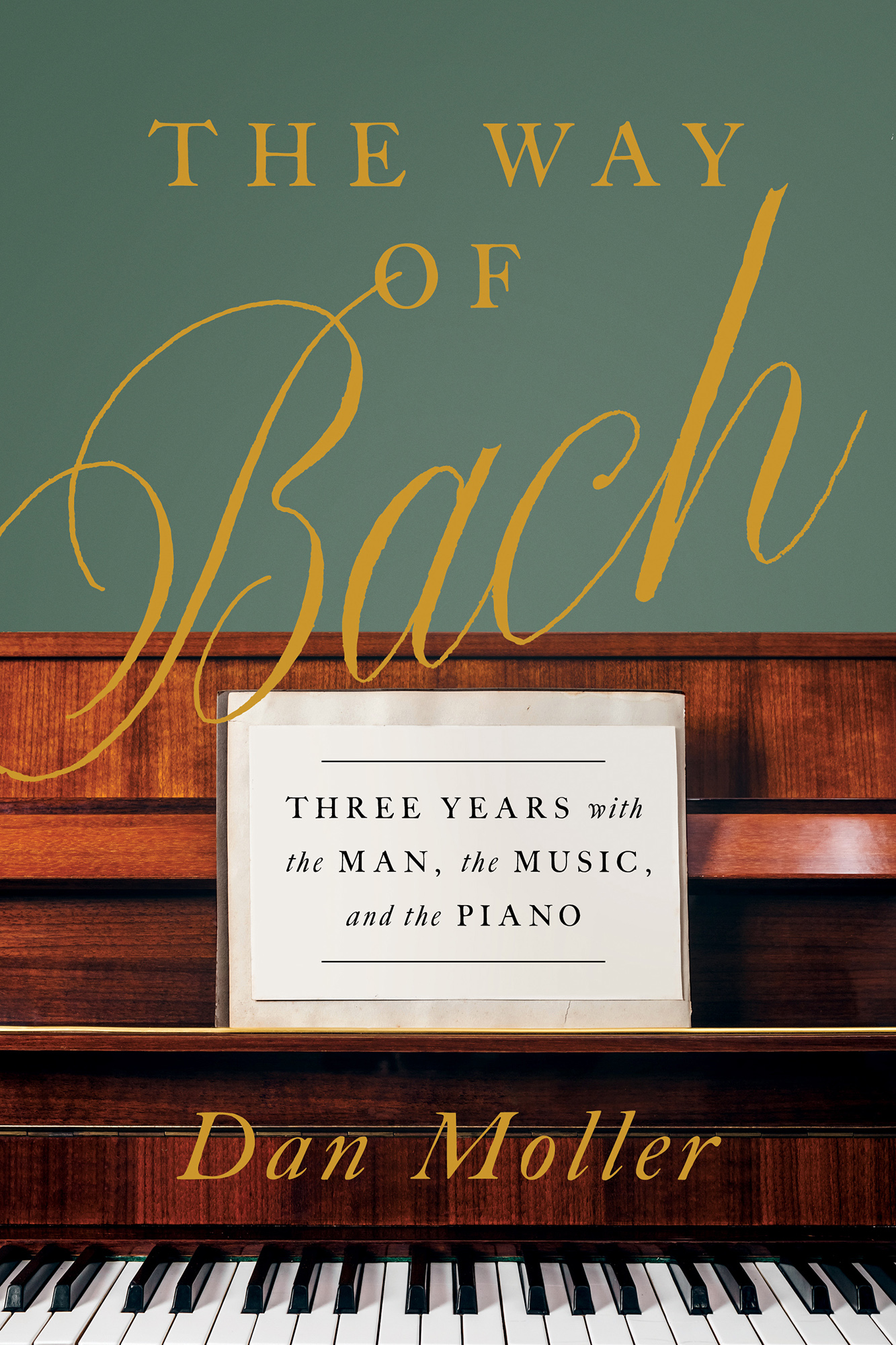Contents
Guide
THE WAY OF BACH
Pegasus Books, Ltd.
148 W 37th Street, 13th Floor
New York, NY 10018
Copyright 2020 by Dan Moller
First Pegasus Books cloth edition November 2020
Bach monogram by Valerii Baryshpolets, loosely following Bachs own designs.
The BWV 847 manuscript appears courtesy of the Staatsbibliothek zu Berlin. https://digital.staatsbibliothek-berlin.de/werkansicht/?PPN=PPN813072077.
Interior design by Maria Fernandez
Jacket design by Faceout Studio, Tim Green
Jakcet imagery from Stocksy
All rights reserved. No part of this book may be reproduced in whole or in part without written permission from the publisher, except by reviewers who may quote brief excerpts in connection with a review in a newspaper, magazine, or electronic publication; nor may any part of this book be reproduced, stored in a retrieval system, or transmitted in any form or by any means electronic, mechanical, photocopying, recording, or other, without written permission from the publisher.
ISBN: 978-1-64313-580-9
Ebook ISBN: 978-1-64313-581-6
Distributed by Simon & Schuster
www.pegasusbooks.com
Preface
T he aim in what follows is not to teach the reader how to play Bach, nor to offer a formal introduction to his life and work. I am a lousy if enthusiastic piano player, and thus unqualified to offer instruction, and I lack the expertise of a historian or musicologist. Aspiring pianists should, if anything, learn from my mistakes, and historians and musicologists will want to denounce my haphazard approach, which is driven by intensely personal likes and dislikesthe minor keys good, the major keys bad, the harpsichord even worse, etc.
What I have tried to convey in this book is rather the felt experience of an adult learning Bach, from the point of view of someone who loves Bach with a completely unprofessional, undetached abandon, and I have tried to explain that feeling in terms of his life and work. My greatest hope for this little diary is that it might inspire one or two people to take up the piano, or recall some musical apostates to the faith.
Music referenced can be found as a playlist at www.danmoller.org.
ONE The Bug

T he desire to play Bach came to me one night in June like a sickness. Or rather, that was the night that the sickness became too much to bear, and I knew that I must simply yield to it, the way those mortally injured eventually close their eyes and find peace in death.
I had tried to learn to play Bach years before, in school, but had utterly failed because of a repetitive strain injury. I decided that listening was enough and that I would find other creative outlets, which is to say that I yielded to temptation and fear and gave up. But by then I was already infected even if I didnt know it yet, and there was no cure. In fact, from the time I heard the first Fugue in C minor from The Well-Tempered Clavier at seventeen, there was always going to be some night of reckoning, some crucible of the soul in which I would have to make my choice.
What was it about that fugue? I didnt even know what the word meant, much less what tempering was, or how to do it well. And in fact, that fugue is far from Bachs best, as I came to see. It lacks the awesome complexity of his later works, featuring only three distinct voices, two of which move in parallel, and few of the ingenious devices the form permits. (On the other hand, the melodic lines are invertibleyou can flip the bottom or middle line to the top and vice versa, which is no mean feat.) An experienced ear would group it with the accomplished but hardly brilliant middle-period works, not in the same class as what Bach produced in the last ten years of his life. It is better, we might say, than almost anything written by his contemporaries, but workmanlike by his own ultimate standards. Perhaps it was its very brusqueness that gripped me as a sullen teenager. I couldnt relate to the gilded parlors of Venice and Vivaldi, or the music of VersaillesI was from the Boston suburbs; I wore flip-flops and T-shirts. But this music, written by an organist glowering in his stony aerie? Well, that made some sense to me. Salem wasnt very far; we read peevish Puritans like Hawthorne in English class, and I sensed a connection.
Listening before I knew what to listen for, that fugue reminded me more of Metallica than the classical music I had heard up till then. The staccato rhythms had an edge that sounded nothing like the tinkly snuffbox that was classical radio. There was an insistence in those sixteenth notes, a frustration that was being worked out. But above all there was that glorious riff that opened the piece and then returned again and again, just like Metallicas Four Horsemen or Seek & Destroy. The texture was thick and complicated, full of activity and substance. I sensed that there were multiple ideas being developed at once, that there were currents rushing beneath the surface in every direction. And yet all of that drama seemed contained and controlled; it wasnt bombastic screeching from Italian opera nor the sentimental mush of a Romantic composer. Nor, on the other hand, was it elegant and perfect like the little Mozart confections I remembered from childhood; there was that roughness. But it was the roughness that can make us enjoy the less mature work of a master, still charged with fury and youth, more than his serene masterpieces. T. S. Eliot may have preferred his later ramblings about time and space, but I liked the bite of the early Prufrock, the comic rage of a man whose life was measured out in coffee spoons.
The normal thing to do at that point would have been to seek out a piano teacher. But being a teacher myself, I had come to form a deep loathing for teachers of all sorts, for pedagogy in general, and for music teachers in particular. Teachers, I found, were usually the chief obstacle to learning anything, or at least they prevented getting any enjoyment out of learning, which was the prerequisite to learning more. Professors resent their students because they stand in the way of writing the obscure articles that lead to academic glory; conservatory-trained musicians teach only when they cannot make music for a living. And once these teachers are reduced to a life of Sisyphus, of endlessly correcting childish mistakes, they lose all joy in their subject matter. Why, that past semester I had corrected plenty of my own students sentences, the most impressive of which read, We must never falter on our beliefs, and crumple at the hands of the opposer, which was so very odd, so mystically strange, that I took to incanting it throughout the day as a kind of prayer. In fact, the only thing worse than teachers are students. They quickly forget why they are studying to begin with and succumb to sloth and distraction, which causes their teachers to adopt a warden mentality, which reinforces the pupils resistance, and so on, in a downward vortex that ends only in the nirvana of summer.
The other problem with the piano teachers was that they would have their own ideas about what to play. I had no interest in playing anything but Bach. Perhaps, in the very distant future, I could imagine attempting Ravel or Debussy, whom I liked, or transcriptions of Wagner, but I doubted I would ever be good enough. And in the meantime, the thought of being tortured through the normal repertoire terrified me. The piano teachers goal is to make the student proficient at playing the piano, but I had no desire to be a good pianist. What I wanted was to play


